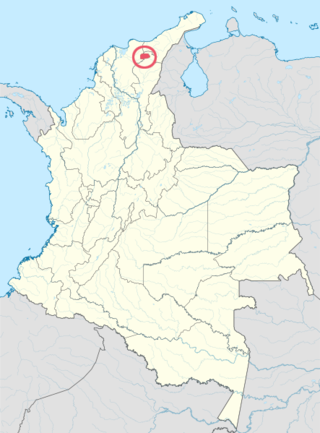Arhuaco language
| Arhuaco | |
|---|---|
| Ikʉ | |
| Native to | Colombia |
| Ethnicity | 14,800 Arhuacos (2001)[1] |
Native speakers | 8,000 (2009)[2] |
Chibchan
| |
| Language codes | |
| ISO 639-3 | arh |
| Glottolog | arhu1242 |
| ELP | Ica |
 | |
Arhuaco, commonly known as Ikʉ (Arhuaco: Ikʉ), is an Indigenous American language of the Chibchan language family, spoken in South America by the Arhuaco people.[3]
There are 8000 speakers, all in the Sierra Nevada de Santa Marta region of Colombia, 90% of whom are monolingual.[3] Literacy is 1 to 5% in their native language. Some speak Spanish, and 15 to 25% are literate in that auxiliary language.[3] The users have a very strong traditional culture and have vibrant use of their tongue.[3]
It is also known as: Aruaco, Bintuk, Bíntukua, Bintucua, Ica, Ijca, Ijka, Ika, and Ike.[3]
The language uses a subject–object–verb (SOV) sentence structure.[3]
Phonology
[edit]| Front | Central | Back | |
|---|---|---|---|
| Close | i ⟨i⟩ | ɨ ⟨ʉ⟩ | u ⟨u⟩ |
| Mid | e ⟨e⟩ | ə ⟨y⟩ | o ⟨o⟩ |
| Open | a ⟨a⟩ |
/ə/ is raised to and merged with /ɨ/ word finally.
This language registers 17 consonant phonemes:
| Labial | Alveolar | Alveolo- palatal |
Velar | Glottal | ||
|---|---|---|---|---|---|---|
| Occlusive | voiceless | p ⟨p⟩ | t ⟨t⟩ | tʃ ⟨ch⟩ | k ⟨k⟩ | ʔ ⟨ꞌ⟩ |
| voiced | b ⟨b⟩ | d ⟨d⟩ | dʒ ⟨ɉ⟩ | ɡ ⟨g⟩ | ||
| Nasal | m ⟨m⟩ | n~ŋ ⟨n⟩ | ||||
| Fricative | voiceless | s ⟨s⟩ | h ⟨j⟩ | |||
| voiced | β ⟨w⟩ | z ⟨z⟩ | ʒ ⟨zh⟩ | |||
| Flap | ɾ ⟨r⟩ | |||||
Syllable structure
[edit]With some exceptions, Arhuaco syllables may begin with up to two consonants (the second of which must be a glide /w j/) and may be closed by one of the following consonants: /ʔ n r w j/.
Prosody
[edit]Arhuaco stress normally falls on penultimate syllables, with secondary stresses occurring on every other preceding syllable, in the case of longer words (e.g. /ˌunkəˈsia/ 'protective bracelet').[4] There are some affixes and enclitics that are extrametrical and do not count as syllables for stress assignment.
Morphology
[edit]Personal pronouns
[edit]| person | singular | plural |
|---|---|---|
| 1st | nən | niβi |
| 2nd | ma | miβi |
| 3rd | a | ikənaʔ |
Frank (1985, 34) lists six personal pronouns for Arhuaco, with singular and plural numbers for first, second, and third persons and notes that they "do not occur very frequently in text; they occur occasionally in subject position, very rarely in object position, and most frequently as the object of a preposition".[5]
Unusually, person marking in Arhuaco verbs has evolved to have effectively become a way to mark epistemic modality or evidentiality.[6][7]
References
[edit]This article includes a list of references, related reading, or external links, but its sources remain unclear because it lacks inline citations. (June 2020) |
Frank, Paul. 1985. A grammar of Ika. PhD thesis. University of Pennsylvania.
Frank, Paul. 2000. Ika syntax. Dallas, TX: Summer Institute of Linguistics.
Landaburu, Jon. 2000. La lengua Ika. in Lenguas indigenas de Colombia: Una visión descriptiva. Bogota: Instituto Caro y Cuervo.
Notes
[edit]- ^ Arhuaco language at Ethnologue (16th ed., 2009)

- ^ Arhuaco at Ethnologue (18th ed., 2015) (subscription required)
- ^ a b c d e f Arhuaco, by Arango and Sánchez, Ethnologue, 1998, access date 16 April 2008
- ^ Landaburu, Jon (2000). La lengua Ika. Bogotá: Instituto Caro y Cuervo.
- ^ FRANK, PAUL STEPHEN (1985). A GRAMMAR OF IKA (CHIBCHAN, COLOMBIA) (Thesis). OCLC 857226516. ProQuest 303374815.
- ^ Bergqvist, Henrik (2012). "Epistemic marking in Ika (Arwako)". Studies in Language. 36 (1): 154–181. doi:10.1075/sl.36.1.05ber.
- ^ Ostler, Nicholas (2000). "The Development of Transitivity in the Chibchan Languages of Colombia". In Smith, John Charles; Bentley, Delia (eds.). Historical Linguistics 1995. Volume 1: General issues and non-Germanic Languages. Selected papers from the 12th International Conference on Historical Linguistics, Manchester, August 1995. Amsterdam, Netherlands: John Benjamins. pp. 279–293. ISBN 978-90-272-3666-1.
